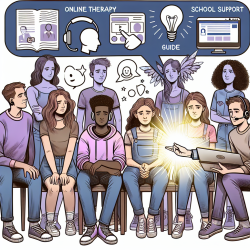How Can Hypertension Management Research Inform Speech Therapy Practices?
At TinyEYE, we are committed to providing exceptional online therapy services to schools. As practitioners, we constantly seek ways to improve our skills and outcomes for children. A recent study on hypertension management in Singapore polyclinics offers insights that can be adapted to our field. Let's explore how we can apply these findings to enhance our therapy practices.
Key Findings from the Hypertension Study
The study, titled "Management of hypertension and multiple risk factors to enhance cardiovascular health - a feasibility study in Singapore polyclinics," explored a structured, multi-component intervention for managing hypertension. The intervention included:
- An algorithm-driven intervention using fixed-dose combination (FDC) antihypertensive treatment.
- Subsidized FDC antihypertensive medication.
- Motivational conversation (MC) for high-risk individuals.
- Telephone follow-ups for all individuals.
The study demonstrated a significant increase in the healthy lifestyle index and adherence to antihypertensive medications in the intervention group compared to usual care.
Applying Research Insights to Speech Therapy
While the study focuses on hypertension management, its principles can be adapted to speech therapy practices:
- Structured Interventions: Just as the study used a structured approach to hypertension management, we can implement structured therapy plans tailored to each child's needs. This ensures consistency and enhances the effectiveness of our interventions.
- Motivational Conversations: Engaging children and their families in motivational conversations can boost their commitment to therapy goals. By fostering a supportive environment, we can encourage active participation and improve outcomes.
- Follow-Up and Feedback: Regular follow-ups and feedback are crucial in maintaining progress. Incorporating technology, such as video calls or online platforms, can facilitate ongoing communication and support for families.
Encouraging Further Research
While the study provides valuable insights, it also highlights the need for further research. As practitioners, we should actively seek opportunities to contribute to the evidence base in our field. Collaborating with researchers and participating in studies can help us refine our practices and improve outcomes for children.
Conclusion
The hypertension management study offers valuable lessons for speech therapy practitioners. By adopting structured interventions, engaging in motivational conversations, and ensuring regular follow-ups, we can enhance our therapy practices and create better outcomes for children. Let's continue to explore and implement data-driven approaches to improve our services.
To read the original research paper, please follow this link: Management of hypertension and multiple risk factors to enhance cardiovascular health - a feasibility study in Singapore polyclinics.










